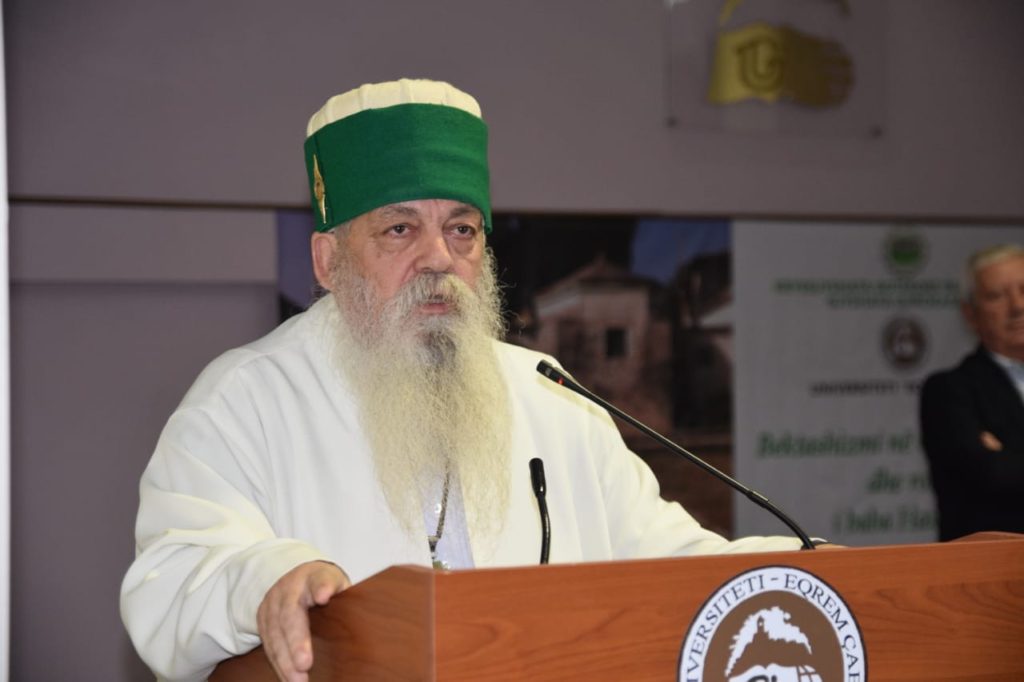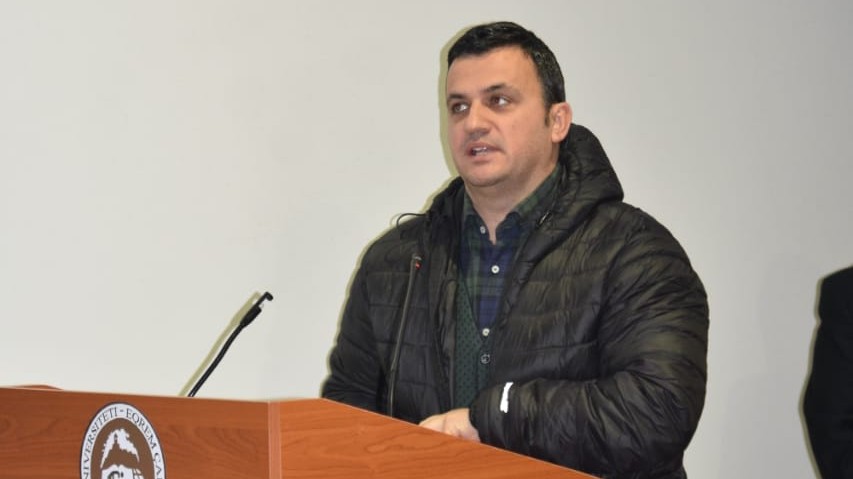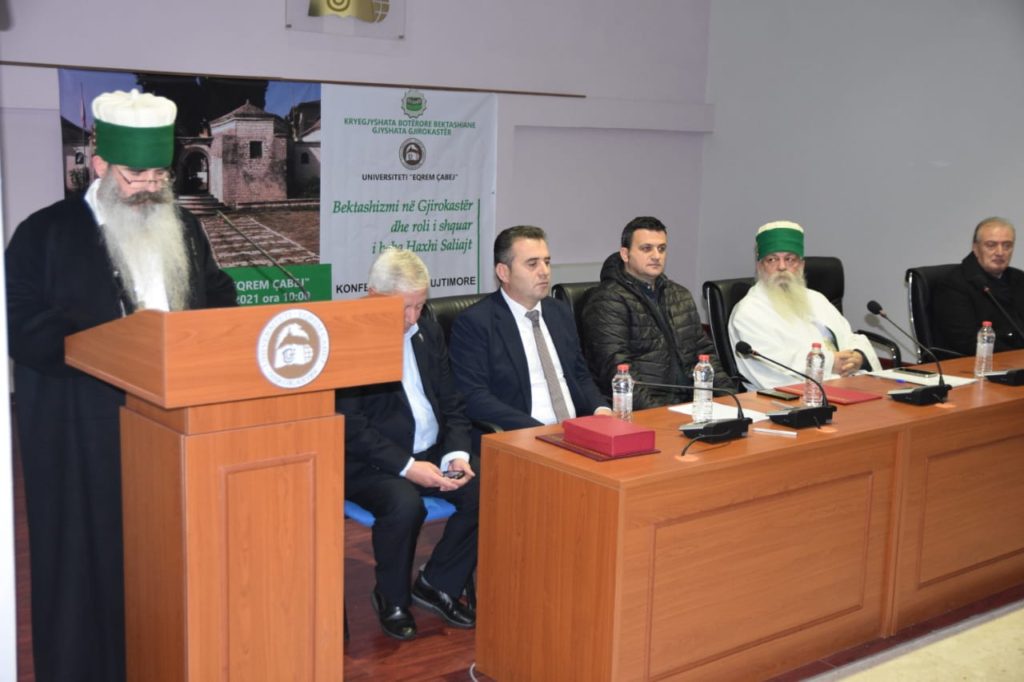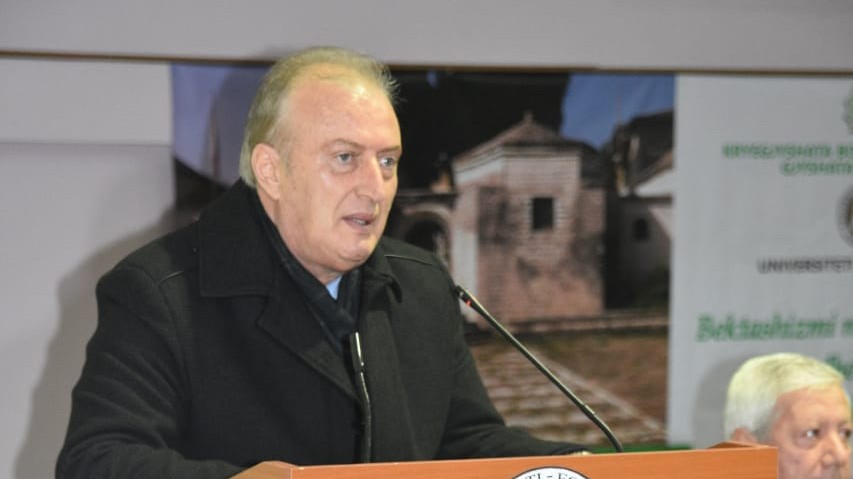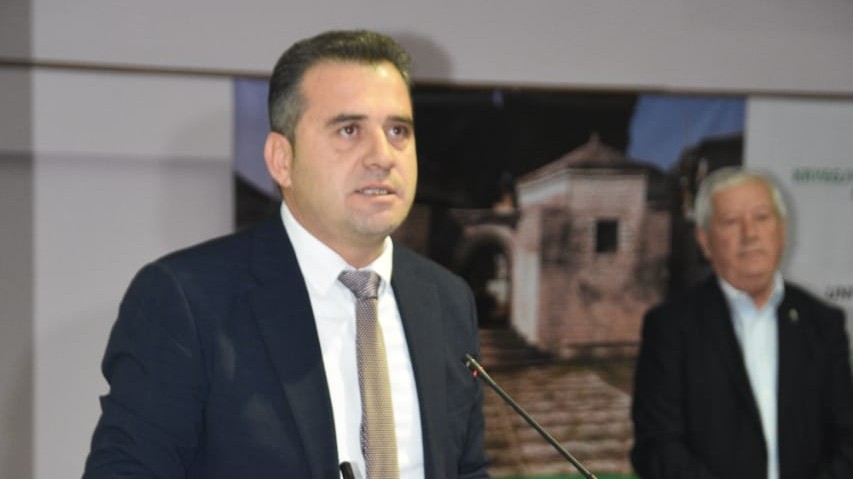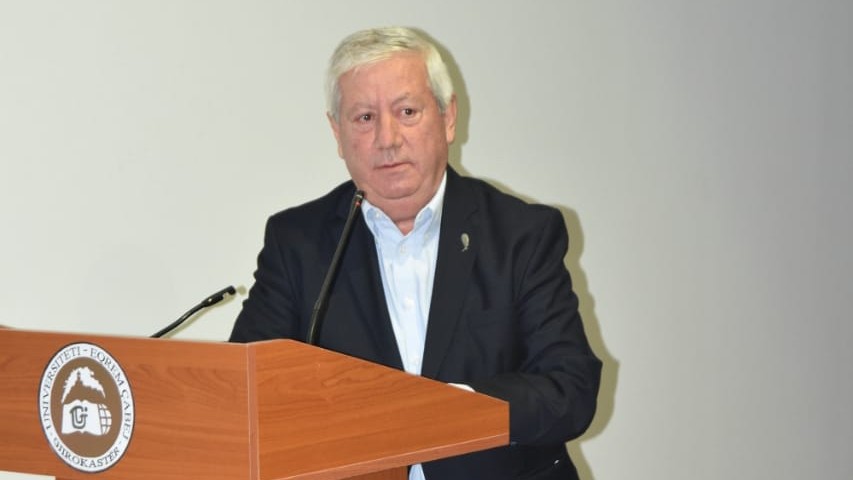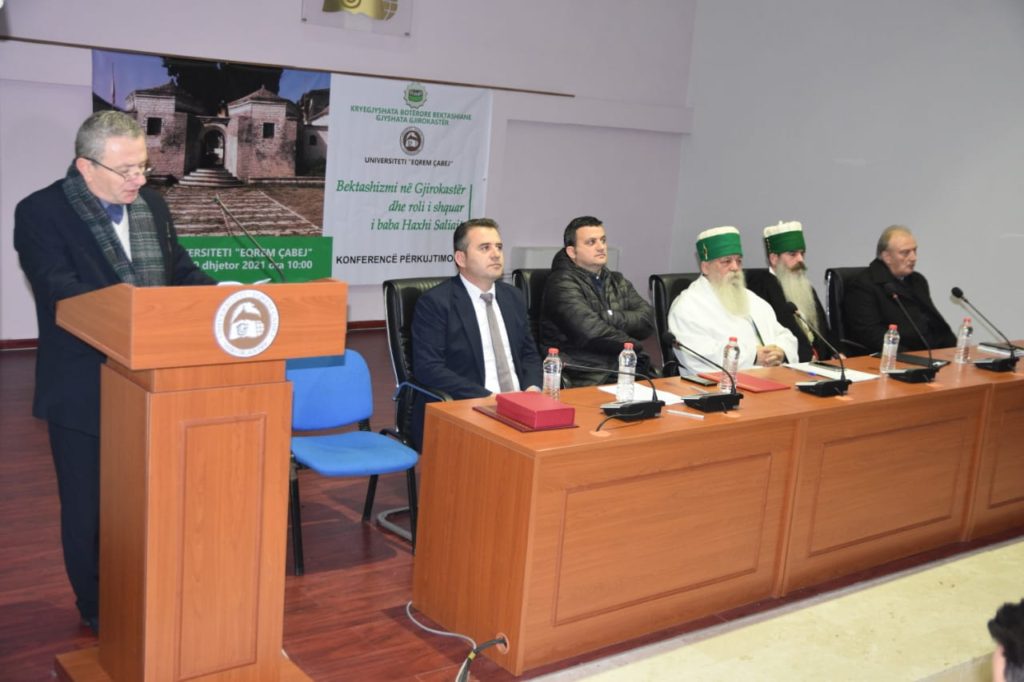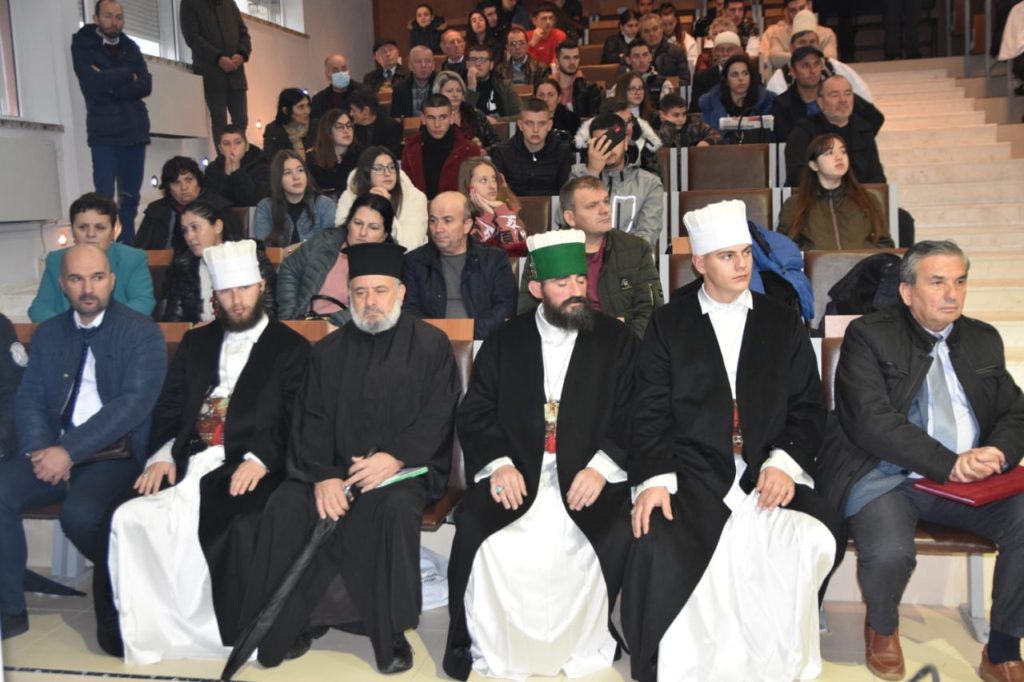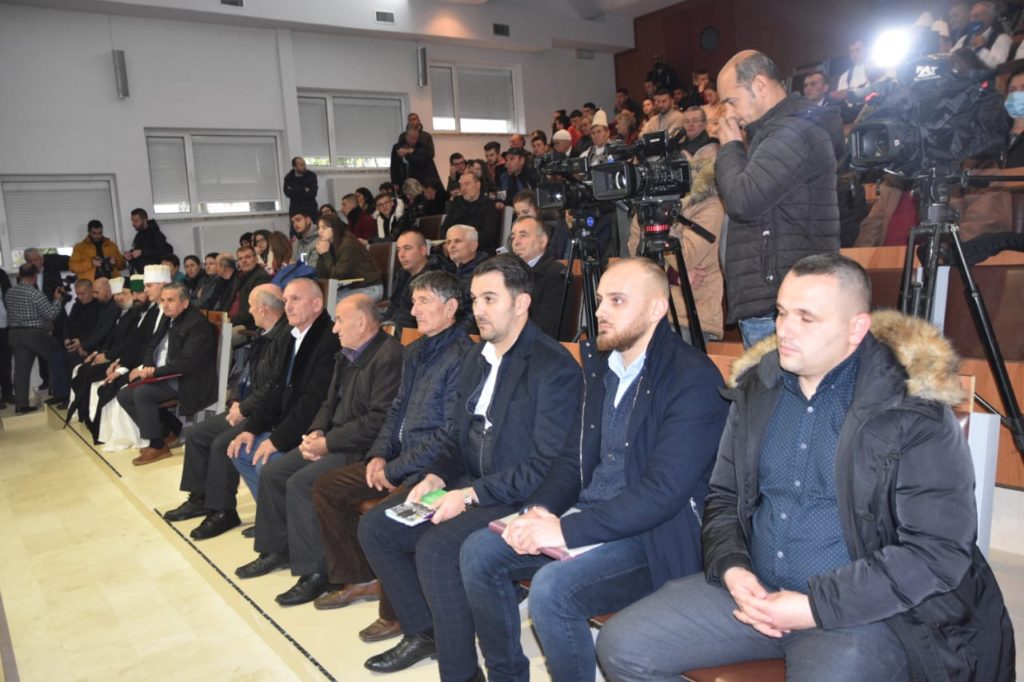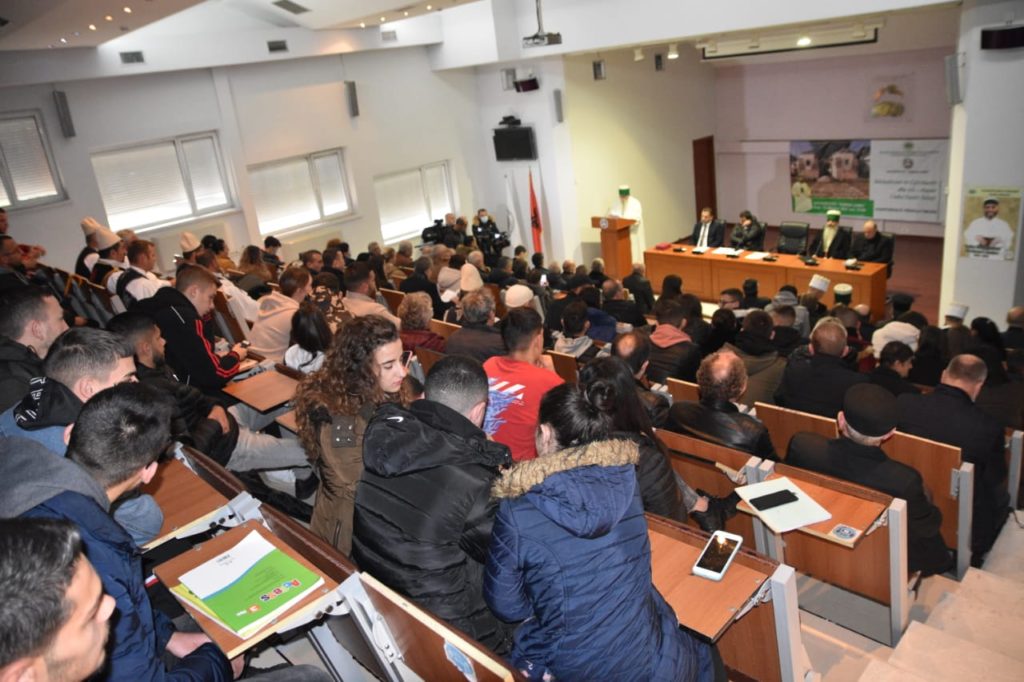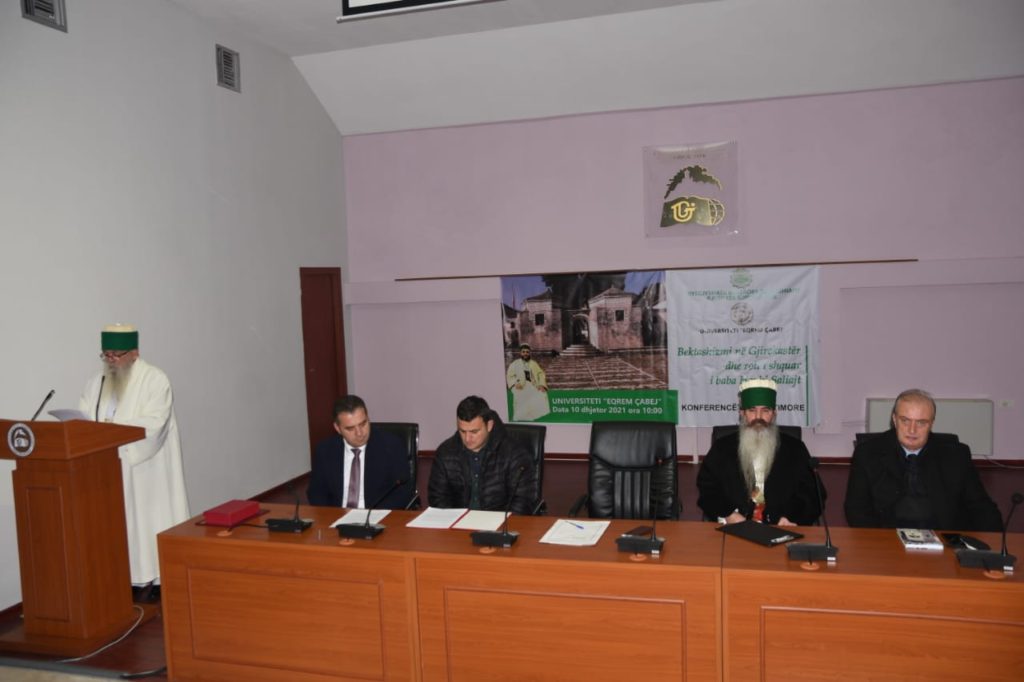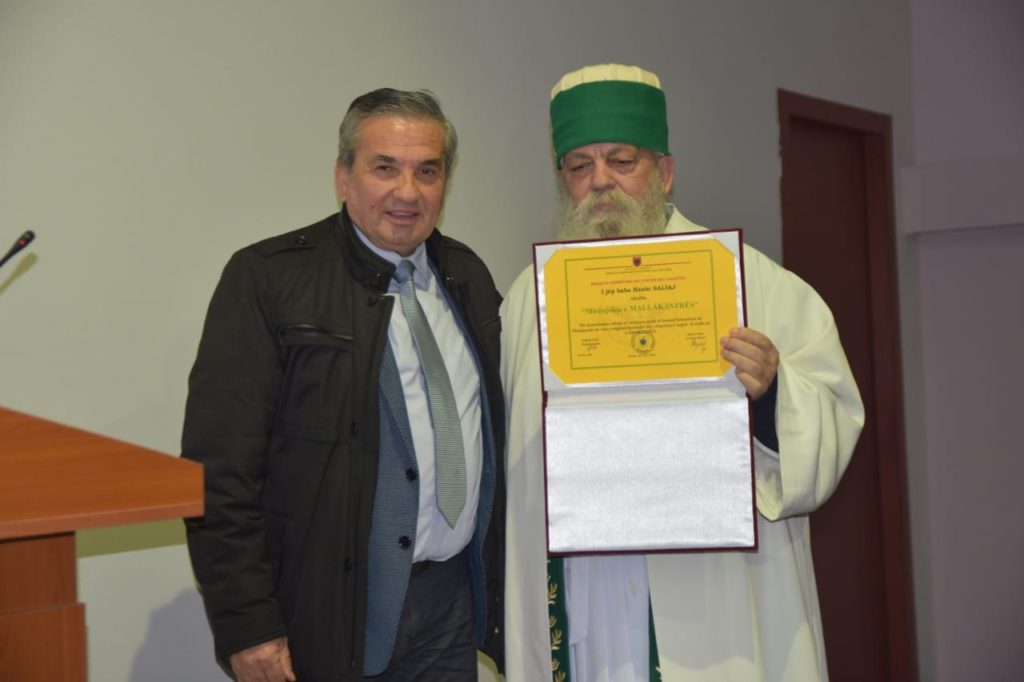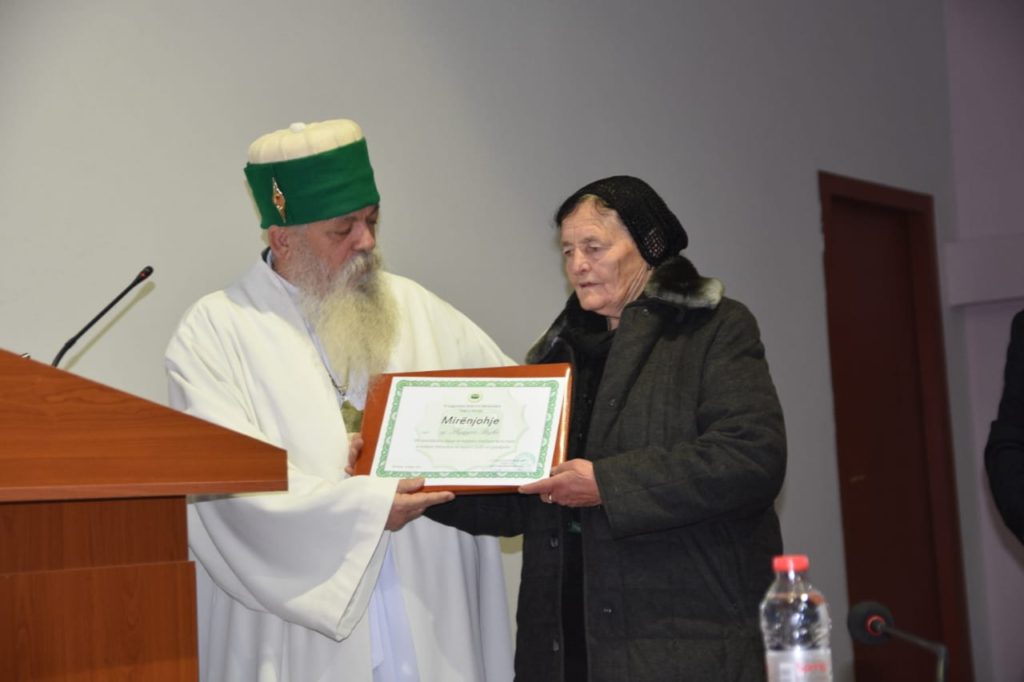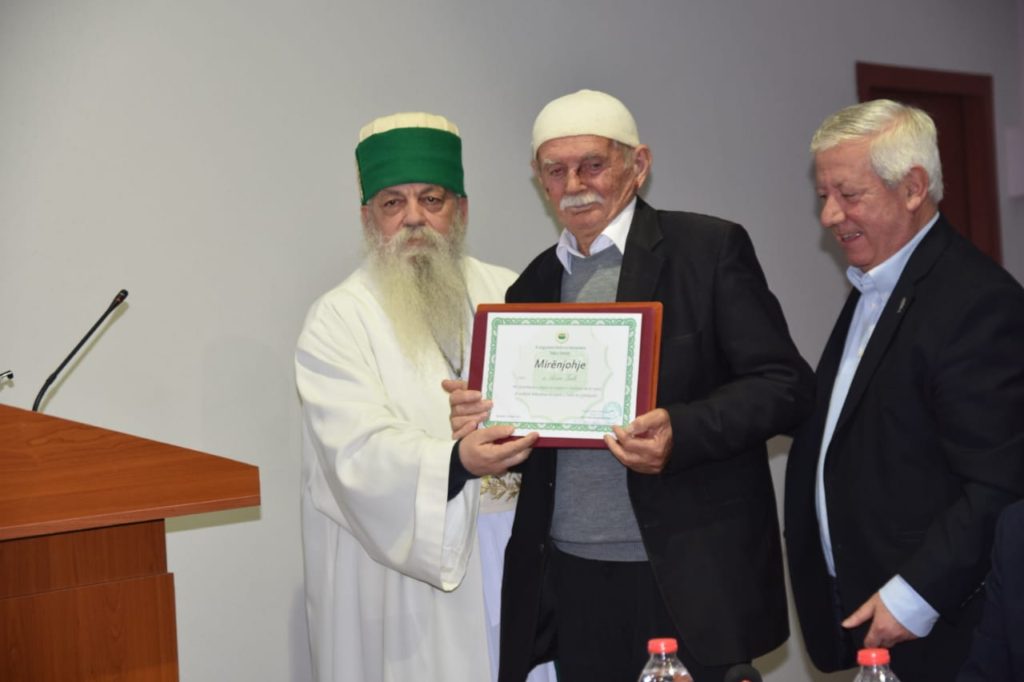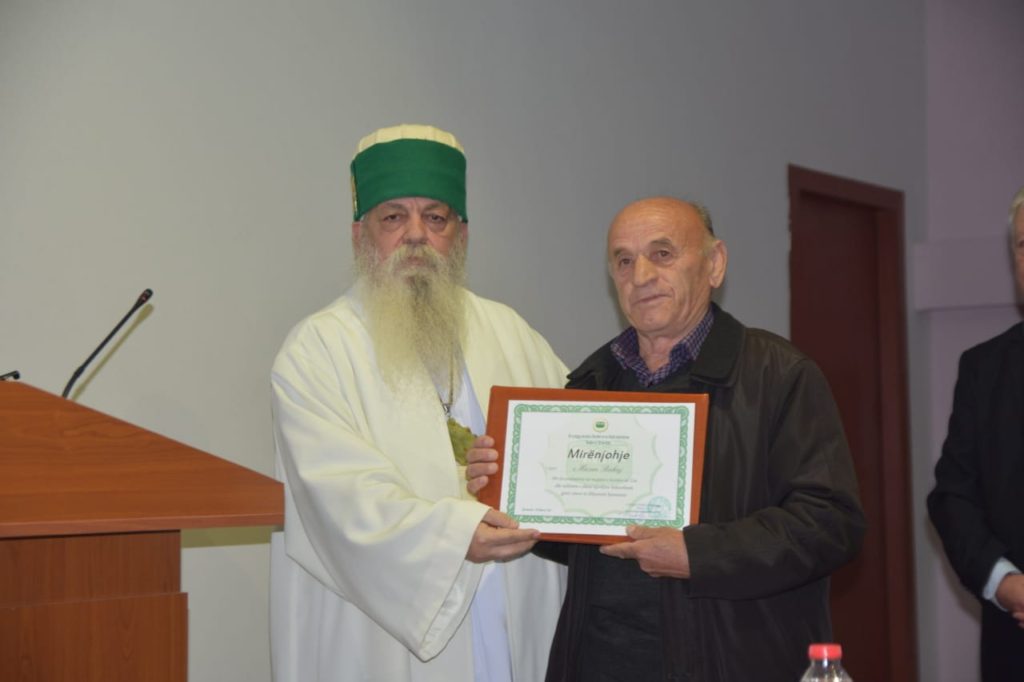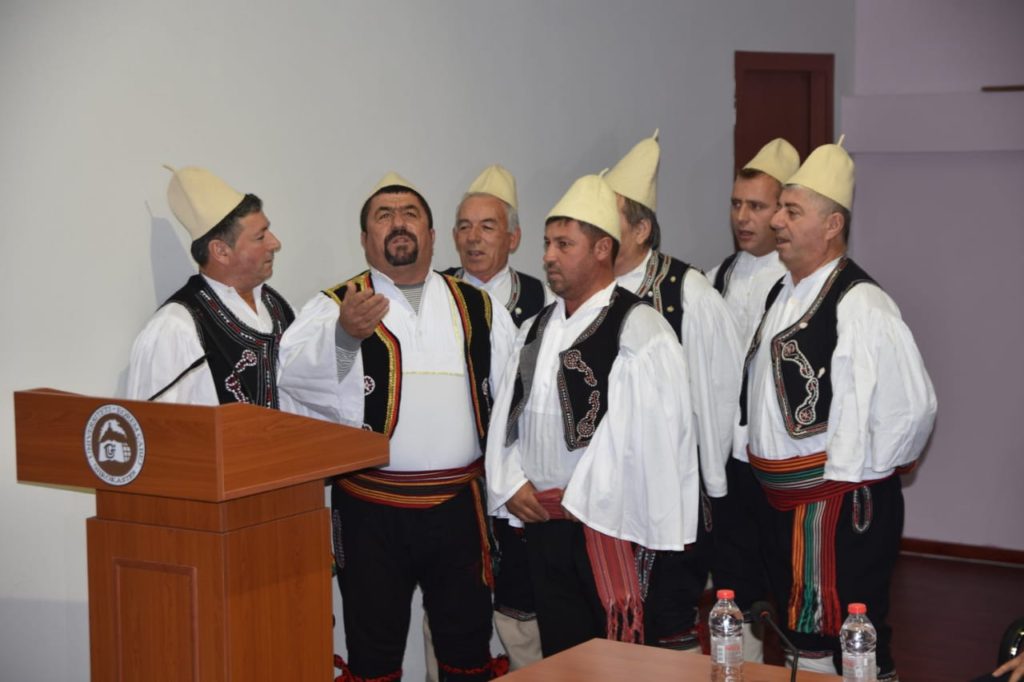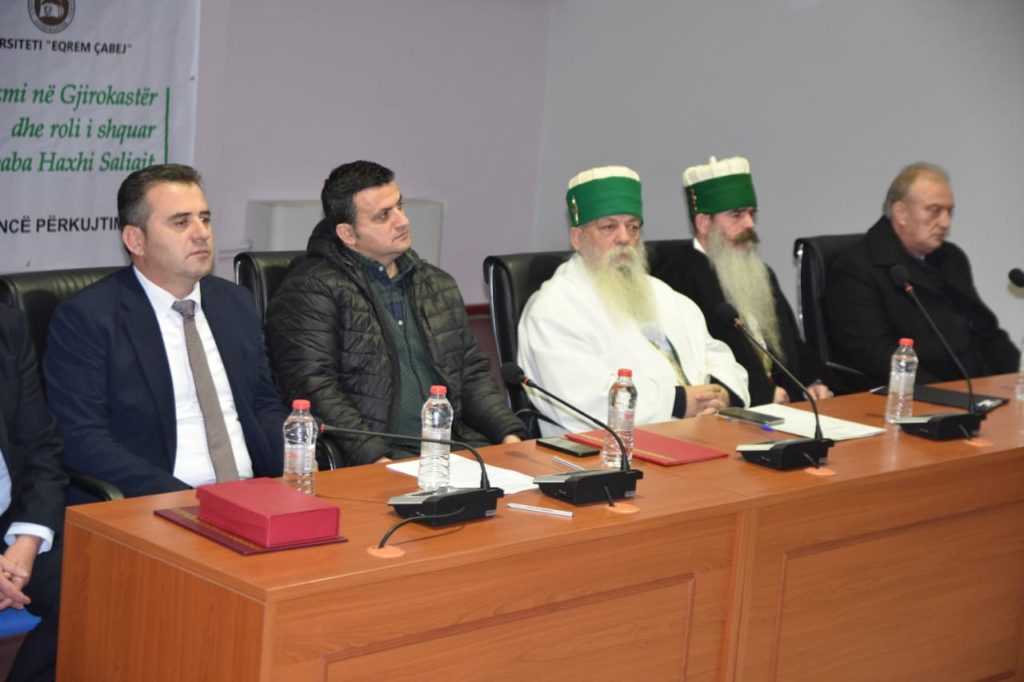
On Friday, December 10, 2021, Father Haxhi Saliaj was commemorated on the 85th anniversary of his birth by holding a conference organized by the Bektashi World Headquarters, Gjirokastra Quarter and Eqrem Çabej University, entitled "Bektashism and Gjirokastra in Gjirokastra" the prominent role of Baba Haxhi Saliaj ”.
The event was opened by the Bektashi World Leader, His Holiness, Haxhi Dede Edmond Brahimaj, as a symbol of nobility.
Haxhi Saliaj is part of the constellation of those Bektashi clerics, who not only did not submit to the propaganda mechanisms of the communist regime, but in the depths of their souls kept alive the unwavering faith in God - said among others the Mayor of Gjirokastra Mr. Flamur Golemi in his greeting speech.
Gjirokastra Quarter, Father Skënder Dervishi, emphasized the role played by Father Haxhi Saliaj in the rebuilding of the Zalli tekke in Gjirokastra, in 1993-2003.
The presentations were also given by history professors at the University of Gjirokastra. Prof. Dr. Shyqyri Hysi made a presentation of the book "Baba Haxhi Saliaj in the memory of generations".
At the conference, several honorary titles were given for the valuable contribution of father Haxhi Saliaj, by the Bektashi World Headquarters, Gjirokastra Regional Council, Mallakastra Municipality and the association "Mallakastra", the area where Baba Haxhi Saliaj was born and raised.
In the end, the polyphonic band made this day even more enjoyable, which was fixed in the Holy See calendar as a marked day.
Greetings of the Bektashi World Leader, His Holiness, Haxhi Dede Edmond Brahiamaj.
Honorable Mayor of Gjirokastra, Mr. Golem! Dear representatives of Gjirokastra Region! Dear representatives of the Municipality of Mallakastër! Dear myhib and myhibe of father Haxhi Saliaj! Dear brothers, humble family members of father Haxhiu! Dear Bektashi brothers and sisters, wherever you live and keep the candles of Haxhi Bektashi's love untouched! May the fountains of the Great God always, the blessings of the dervishes and the fathers who through their spirit, from century to century turned our tariqat into an eternal devotion and unique brotherhood in the whole world!
Bektashism, throughout its existential history, has always gone through difficult paths, steep peaks and abysses of all kinds, influenced by currents and schools within the venerable Muslim family, but also against the world religious mosaic. In every age or place, from Asia Minor to Canada, in every situation of persecution or excitement, this sect has always manifested the most sensitive values, the most extreme respect and brotherhood, for whomever fate has placed on its side. The motto that "we belong to God and to Him we will all return" has been and remains the cornerstone in the spiritual structure of the tariqah.
It is only natural that Bektashi thought and action should be based on his travels, the Qur'an, and the prophetic tradition. Despite any misunderstandings at religious crossroads, our tariqat has remained faithful to this tradition, which has always called for unity. The words of the Prophet Muhammad, peace be upon him, are still lapidary in what we all call the word of farewell, and where, among other things, it is stated: White is no better than black, nor is black better than white… Be merciful to one another! Be brothers and sisters among you! Support each other like bricks and keep your community building strong! ”
From these dervishes and fathers, Haxhi Saliaj received the first lessons, which were intertwined with the secrets of the tariqah as well as with human destiny. Because we all know that at the age when the wise boy from Ninëshi knocked on the door of the tekke, he was an orphan, without a mother and without a father. The father was the victim of that ruthless movement, which for half a century we called the class war, while his mother, would leave this world with great concern for the barbaric execution of her husband and the black future of the children. In this context of that sad reality, the tekke was and remained until the end an oasis of peace, when the soul of our brother, Haxhiu found the permanent rest of his soul.
Islam throughout its history, has addressed the believers through their intellectual and spiritual sensibilities, without forcing anyone, on the contrary, to lead their followers to think of securing a close, secure and eternal relationship with God. Exalted. The Bektashi sect, in this context, has conveyed, among other things, an independence and admiration in its concept and philosophy, without showing in any case a sense of superiority over others, on the contrary by inviting them to its unique brotherhood. This was one of the first lectures that the boy from Ninëshi received and embraced in the tekkes of Mallakastra, feeling himself in a way "a biological orphan" but surrounded to the end by thousands of brothers, sisters, sons and daughters of Hak .
The handshake in the tekke of Harakop, in Krahës of Tepelena, in 1954, to father Asim Shehaj, remains a milestone in the spiritual journey of the myhib, Haxhi Saliaj. Many subsequent events are related to this major act of personal life, where each of us who has experienced it, has very clear the reality of the biological family with that of the tariqat family, whose boundaries have been forever ignored, approaching through the most valuable Bektashi features, that miracle we often regard as the brotherhood of Haqq. Our friend and brother Haxhi Saliaj, exactly at the most beautiful age for every man, agreed on this occasion to carry on his shoulders, such weights that would hardly be carried by his peers. In the end, this is how the Bektashi journey begins,
Afterwards, the wise Haxhi Saliaj takes the road to the Holy See in Tirana and with the idea of throwing over his shoulders the centuries-old arc of the tariqat, he attends classes at the school of dervishes. Judging by the distance of almost seven decades, the then school of dervishes in Kryegjyshata, makes you think deeply. In their first steps, the future clergymen received knowledge of reciting and commenting on the Holy Qur'an, lessons in Persian, Arabic and Turkish, lectures on Bektashi world literature, as well as the history of the Tariqat in Albania. I believe that one of the contributions of the World Headquarters in those years, uncle Ahmet Myftari, is exactly the call to the Holy See and the economic care he showed for scholars of Islam and foreign languages, who thanks to his warmth and care,
This knowledge, for Haxhi Saliaj and all his fellow students, future dervishes, was intertwined with the Bektashi tradition of the Albanian territories, in which mystical knowledge was acquired step by step. Hynqar Haxhi Bektash Veliu, referring to the Supreme God centuries ago, always recalled a saying of His: “I have built a house of light and left a trust in the interior of man. I added the name to my heart. It is in such a divine state, that it is taken as the widest thing in the world. Giving that house is divine knowledge. Her heaven is faith. Her sun is desire. Her moon is the conversation of love. Its stars are knowledge. Its mountains are prayers. Her tree is service. Its leaves are the attitude and its fruit is the meaning. This house has four gates: the first is knowledge, the second is gentleness,
With such a multifaceted formation, the boy from Ninëshi of Upper Mallakastra, receives the honorable title of dervish and leaves for the tekke of Çorrush, by order of his uncle Ahmet Myftari. But, as rarely in the history of the tariqah, his human destiny would not be the same as that of his ancestors. It was 1958 and now the disappearance of religion by the regime was seen as something essential, which had to give way to those evil ideologies, not only morally but also religiously and humanely. After the beheading of Bektashi clerics in the years 1945-1955, it was the turn of Dede Ahmet Myftari, whose internment in the ruined tekke of Drizari in Mallakastër, would be one of the acts of that tragedy. With his departure from the post and from Tirana, a clear message was given to all Bektashi clerics that the atheist storm would soon pass into Albanian soil. This was the reason why, still in the first steps of the clergyman, dervish Haxhi Saliaj goes to perform compulsory military service, to continue later in the atmosphere of deep human despair, in those years when the state, wanting to destroy religion, in indeed violated the most fundamental freedoms of its citizens.
But even in the unimaginable years of the prohibition of religion by the Constitution, dervish Haxhi Saliaj, did not interrupt for a moment the journey to his divine mission. He knew how to bravely endure any insult, ridicule or persecution of that regime, showing to everyone, precisely the emblematic patience of the line of Bektashi clerics and their indomitability, to any attempt to shake faith in God. The steps of this compassionate and speechless pilgrim were felt during the years 1965-1990 in the neighborhoods of Mallakastra, in those houses where spiritual poverty and that of human life, competed with each other. With his wise words, with his hopeful thought, with the spirit within which were the sacrifices of hundreds of previous clergymen, the dervish Haxhi Saliaj, would remind everyone, that the All-Merciful puts us all to the test. Blessed is he who succeeds in this test, to live happily in both worlds!
With the extraordinary intuition through which he approached the dignity of the believers, dervish Haxhi Saliaj joined other prominent clerics who had open accounts with the regime such as: grandfather Ahmet Myftari, father Sherif Canometaj, father Selim Kaliçani, father Bektash Kozeli, father Hadim Therepeli, dervishes Reshat Bardhi, dervishes Ismail Jangulli, etc., who, regardless of the state inquisition, always lived their lives within the rules of the tariqah, inviting generations of believers to follow them. For such clerics, gratitude is very little. Thanks to their courage, we were able to preserve the traditions of the ancients even in the conditions of the deepest illegality, we mourned, we remembered the tragedy of Karbala, we celebrated the holy day of Sultan Novruz, we stood next to each other for good and in evil,
Meanwhile, we are equally aware that this constellation of pure-hearted clergymen was respected and kept as small waters, in the great ranks of the believers, over whom, not infrequently, they have the storms of state persecution. In particular, the Bektashi myhibs and benefactors of Lazarat will be remembered with deep respect in the generations of believers for their courage, for their unparalleled self-sacrifice, walking bowed before the myrshids, but bowed before the segments and tools of the regime we passed.
Walking alongside their myrshids, the generations of believers of those years, within the religious mission, within the wars to save their souls from the egos of this world, were able to build mutual relations not only within but also within other religious communities, but also with society itself, always seeing these relations within the boundaries of the contexts of universal mercy and Bektashi supplication. The nobility with which our spiritual parents nurtured us led us to build those necessary and wonderful bridges to one another. What helped us to overcome all kinds of social barriers.
Together in our devotion to the Creator, clergy and believers, came full of hope in the early 1990s, the century we left behind. Dervish Haxhi Saliaj, in the first group of Bektashi clerics, would immediately line up in efforts and sacrifices, to resurrect the tariqah from ruthless demolition. Aware of his mission, he would confront religious ignorance, the evil ideas that had labeled religion as "opium for the people," dismantling all those atheistic legends about the life of the Bektashi fathers, and revealing the values of truths of faith. But even this time, when democracy was taking irreversible steps in the history of Albanians, our dervish, the brother and friend of all the believers of the south, never raised his voice, never cursed and cursed,
With the appointment to the Zall tekke in 1992 and then with the consecration of "Baba" by Haxhi Dede Reshat Bardhi, to the wise and noble man of Ninesh, a whole community of believers, old and young, would support their hopes. Young. The former, those of old age, would rediscover through the features of Baba Haxhiu, the magnificent pictures of the former tekke of Zall, while the younger ones, would be filled with the enthusiasm of age and the divine divine knocking, to approach fresh fountains of faith. With his multifaceted nobility, Father Haxhi Saliaj, knew how to offer everyone, the orientation towards sublime and divine values, the obligatory understanding of social challenges, as well as the salary of the soul. He walked in the golden footsteps of his ancestors of the Zall tekke,
My friends!
Personally, I had the great fortune to meet, talk and spend whole days and nights, beautiful but also painful, with father Haxhi Saliaj. We met and worked together in a time of great change, in that often deadly brawl of political systems. Breaking from the faith in God, had violently disfigured the Albanian society, had led it to dangerous moral turmoil, had denatured our own human code, removing our mercy and filling our souls with resentment of all kinds. We saw this hope killed in our every step, in every group of believers, in every tekke we went to. But believe me: with clerics like father Haxhiu you felt almost negligible this weight and this has been among the reasons we triumphed over grievances, divisions, revenge and other human ugliness. Baba Haxhiu, every word, every assembly,
His great soul always had a place, both for the shocking testimony of Lazarat's myhibs, and for the sorrows of the Mallakastra, and for the sorrows or joys of the Tepelena believers. In Bektashi mysticism, the soul is the throne of God and I believe that through the spirit of Father Haxhiu, the believers of the whole South of Albania, have been and remain before His eyes, in that attention to which we all run, who want to wave free and unblemished the flag of the tariqat. It is in his and God's right for everyone to talk today about the miracles he has seen or heard about father Haxhiu. Personally, I think that the most wonderful feature that I have noticed in him, is exactly the awkward and magnificent nobility, with which he has faced countless challenges, to come to the moment of departure from this temporary world. This model is definitely exciting and admirable for every generation of Bektashi clerics.
Sisters and brothers!
On this jubilee of the 85th anniversary of the birth of Haxhi Saliaj, us as the Holy Bektashi Headquarters, realized, among other things, for a book of studies and impressions of this valuable clergyman. I take this opportunity to thank my friend and collaborator, Mr. Syrja Xhelaj, for the face-to-face conversations with the kindness of father Haxhiu, taking care of every detail of his life. I also have the pleasure to thank from the bottom of my heart, all those personalities, friends and relatives of father Haxhiu, who found the time and helped to bring the book to light.
As you may be aware, in our Holy See, we have taken the initiative to collect memories, photographs or anything else related to the work of Bektashi dervishes and fathers, creating separate files for each of them. In this context, we are attentive and very open, to deepen this initiative for father Haxhiu, to enrich him further, as for all dervishes and fathers of Gjirokastra Quarter, not just to fill the archives, but to learn and be guided by their wonderful religious and patriotic example. No matter how far we go in the currents of the present century, we will always need the precious memory of our ancestors. Thank you all once again! God bless you! Amin!
